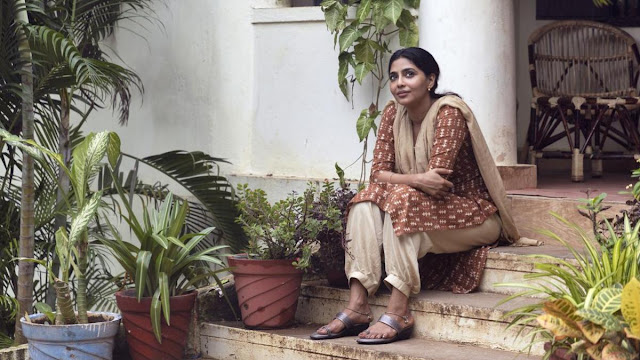The electricity in the house has gone off, the candles are out, and faces are barely visible. If there's one sign for Ammu that the police inspector she's going to marry is a shady guy, this is it. Ammu (Aishwarya Lekshmi) initially has no reason to complain. Ravi (Naveen Chandra) builds up marital passion. His colleagues marvel at Ammu's dedication. I will cut in two the man who dares to harass my wife, the husband declares that he soon begins to harass his wife.
Ravi's dark side is expressed in the purple bruises he leaves on Ammu's body. He has a way of making Ammu feel responsible for the violence, a familiar trap that director Charukesh Sekar's script and Padmavathi Malladi's dialogue deftly brings out.
The Telugu-language Ammu, which premiered on Amazon Prime Video, finally finds a solution to Ammu's plight in the form of Prabhu (Bobby Simha), a paroled convict. If Simha is an unusual casting choice, the suggestion that a story of domestic abuse may contain a feel-good element is also unlikely.
Director: Charukesh Sekar
Writers: Charukesh Sekar, Padmavathi Malladi
Stars: Aishwarya Lekshmi, Naveen Chandra, Bobby Simha
However, Sekar's feature film debut (he previously contributed an episode to the anthology film Bench Talkies and directed the TV show Triples) sells his swagger strongly thanks to strong performances, cinematic skill, and a compelling exploration of the complexities. of domestic abuse.
Naveen Chandra is effective in the thankless role of the khaki-clad torturer. The inimitable Bobby Simha is an excellent choice as the happy-go-lucky Prabhu, giving Ammu the strength he needs to take on his demons. An excellent cast supports the main actors, including Satya Krishnan as Ravi's junior officer and Raghu Babu as a beggar who tells Ammu what he doesn't want to hear.
Aishwarya Lekshmi's consistently impressive performance is especially powerful in the moments when she depicts the dual states of self-awareness and self-loathing that characterize her character. Lekshmi masters one-shot scenes that reveal the conflicting emotions faced by women who are unable to flee abuse despite having the resources to do so.
A scene revolving around Ravi's attempted slap and make-up is all the more effective because Sekar and cinematographer Apoorva Shaligram keep the camera focused on the couple, refusing to interrupt the force of Ravi's manipulation and the rawness of the terror. of Ammu. In another scene, Lekshmi's face fills the screen as Ammu provides a rationale for why she should leave Ravi and stay with him.
Ammu is not the first woman to have confused toxic power with "love." Although the film makes Ammu bear the burden of her agony and presents Prabhu as her salvation, director Sekar never lets Ravi get away.
The scripted stunts to corner Ravi belong more in the wish-fulfillment fantasy zone than the sobering, plausible movie Ammu is most of the time. Ammu's attempts to keep Ravi from getting into her head always ring truer than the events that follow. While films about pressing social issues often take escapist escape routes, Ammu pays more attention than most to the harrowing journeys required to reach the light.

Comments
Post a Comment